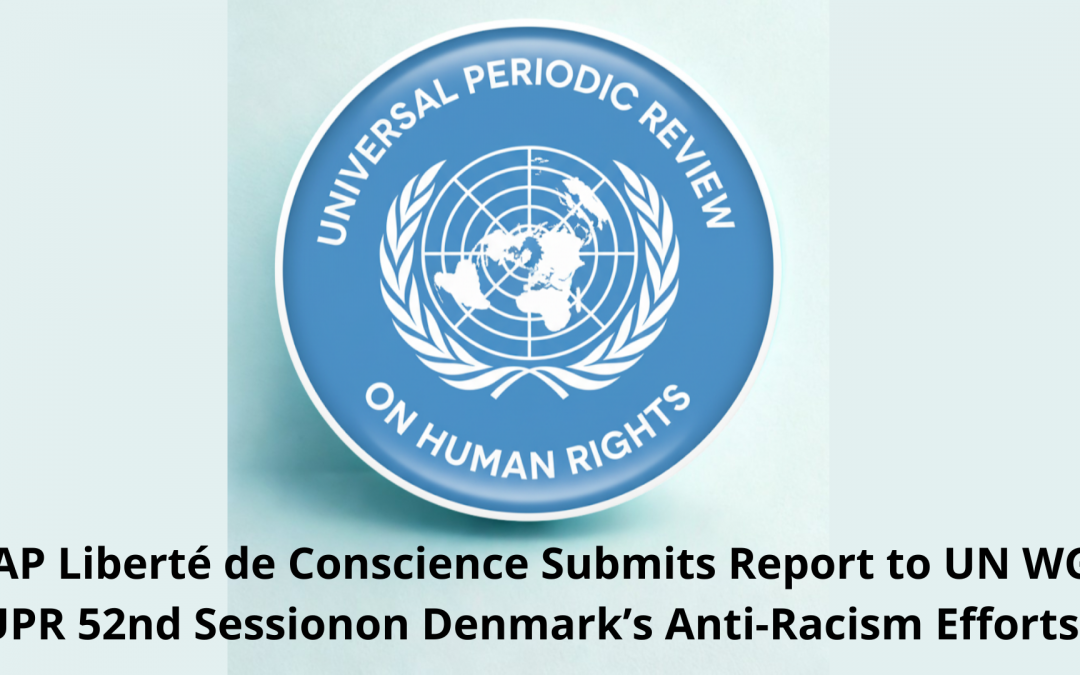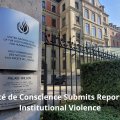CAP Liberté de Conscience (CAP LC), an international non-governmental organization with consultative status at the United Nations, has jointly submitted a report for the 52nd session of the Universal Periodic Review (UPR) Working Group, focusing on Denmark. This expert analysis was prepared in collaboration with Mr. Bashy Quraishy, Secretary General of the European Muslim Initiative for Social Cohesion (EMISCO), and Mr. Gregory Christensen, Leader of Youth for Human Rights – Denmark. Both experts are members of the Advisory Board of the Danish Institute for Human Rights and bring decades of experience in human rights, anti-discrimination, and minority integration work within Denmark and the European Union.
The Universal Periodic Review (UPR)
The Universal Periodic Review (UPR) is a unique mechanism of the United Nations Human Rights Council that involves a periodic review of the human rights records of all 193 UN Member States. The objectives of the UPR are to improve the human rights situation on the ground in every country, address violations wherever they occur, and share best practices among states and other stakeholders. It is a state-driven process conducted under the auspices of the Human Rights Council, which provides each state with the opportunity to declare what actions they have taken to improve human rights and to fulfill their human rights obligations. The review is based on information provided by the state under review, reports from independent human rights experts and groups, and information from other stakeholders, including national human rights institutions and non-governmental organizations.
Objectives of the Joint Submission
The primary objective of the joint submission by CAP LC, EMISCO, and Youth for Human Rights – Denmark is to provide an expert analysis of Denmark’s first National Action Plan Against Racism (NAPAR). The analysis evaluates whether the NAPAR constitutes an adequate response to the recommendations Denmark received during its previous UPR cycle, particularly those pertaining to structural racism, xenophobia, and discrimination against vulnerable communities. The report draws on prior recommendations from UN member states and treaty bodies, as well as assessments from European monitoring bodies, to identify significant gaps in the Danish government’s approach.
Analysis of Denmark’s National Action Plan Against Racism (NAPAR)
The joint submission acknowledges the introduction of Denmark’s first NAPAR as a positive step but identifies several critical shortcomings that undermine its potential effectiveness and alignment with international human rights standards.
A major gap highlighted is the plan’s failure to explicitly address anti-Muslim racism and Islamophobia. Despite repeated recommendations from bodies such as the European Commission against Racism and Intolerance (ECRI) and specific calls from UN member states like Malaysia and Venezuela, the NAPAR omits any mention of Muslims as a specific target group. This omission is significant as it prevents the development of tailored policies to combat the specific forms of discrimination faced by Muslim communities, including surveillance, workplace discrimination, and religious profiling.
Furthermore, the report notes the absence of a standardized, nationwide system for collecting disaggregated data on hate crimes and hate speech. The lack of data categorized by ethnicity, religion, gender, and other criteria hinders the ability to accurately measure the scope of racism, identify trends, design targeted interventions, and evaluate the effectiveness of policies. This gap directly contradicts a key recommendation from the UN Committee on the Elimination of Racial Discrimination (CERD).
The analysis also finds that the NAPAR neglects to institute essential structural and legislative reforms. It does not include clear prohibitions on racial and religious profiling by law enforcement, nor does it address stigmatizing national policies such as the so-called “ghetto law” (parallelsamfundsloven), which has been criticized for leading to forced evictions and the disproportionate targeting of residential areas with predominantly minority populations. The plan’s narrow focus, which only explicitly names Jewish and Greenlandic communities, overlooks other vulnerable groups such as Afro-Danes, Roma, and migrants.
Finally, the submission points to a lack of provisions for independent monitoring and meaningful participation from civil society. The NAPAR does not establish a statutory, independent body with investigatory powers to monitor its implementation, nor does it guarantee multi-year funding for grassroots anti-racism organizations. This top-down approach risks a lack of accountability, sustainability, and community ownership of the anti-racism efforts.
Recommendations
Based on this analysis, the joint submission puts forward a series of concrete, evidence-based recommendations for the Danish government to strengthen its National Action Plan Against Racism and ensure compliance with its international human rights obligations. These recommendations include:
- Explicitly include anti-Muslim racism and Islamophobia in NAPAR. The plan should name Muslims as a protected target group and incorporate tailored measures to address the specific discrimination they face, as repeatedly recommended by ECRI and UN bodies.
- Establish a standardized system for disaggregated hate crime data collection. Denmark must implement a unified framework to collect, analyze, and publish comprehensive data on hate incidents, disaggregated by ethnicity, religion, gender, and other criteria to enable transparent and evidence-based policymaking.
- Prohibit racial and religious profiling and reform discriminatory urban policies. The government should introduce clear legal bans on profiling, abolish stigmatizing labels like “non-Western” in official discourse, and reassess the “ghetto law” to prevent forced evictions and promote inclusive, community-led urban development.
- Ensure independent monitoring and meaningful civil society participation. Denmark should create an independent anti-racism commissioner role with investigatory powers and a mandate to publish annual evaluations. Furthermore, the government must guarantee multi-year funding for NGOs and ensure the formal participation of affected communities in the co-design and implementation of all anti-racism measures.





